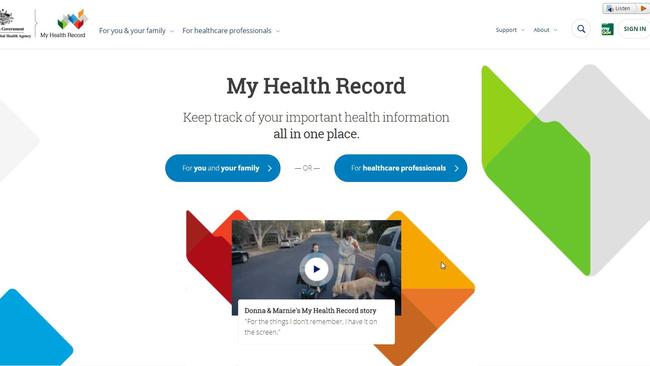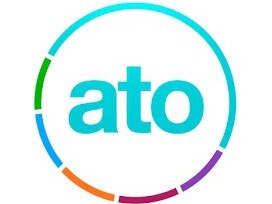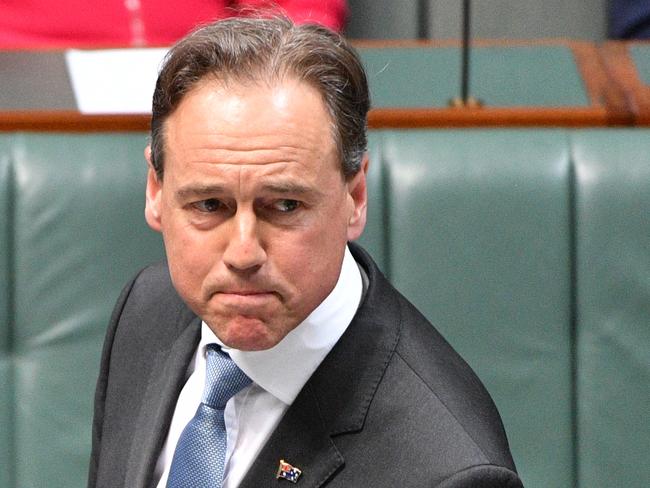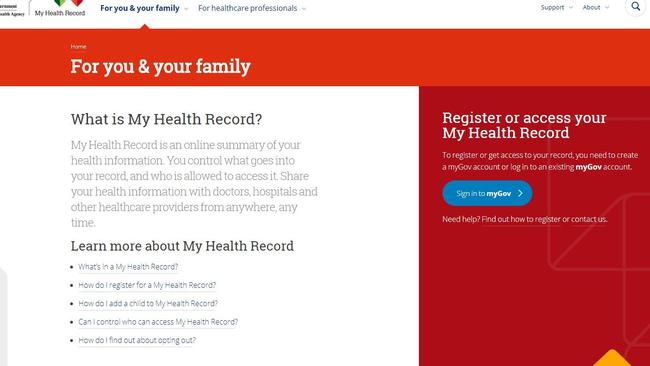My Health Record risks, benefits and how to opt-out
It’s not just your doctor who will have access to your health details under the controversial My Health Record system - your sensitive medical history will be easily accessible by many other people and organisations.
Health
Don't miss out on the headlines from Health. Followed categories will be added to My News.
Exclusive: Every Australian will get an online My Health Record unless they opt out by January 31 next year.
The record will contain sensitive information on the medicines you are taking, your medical consultations, medical test results and reveal if you have had an abortion, a mental illness, a sexually transmitted disease or a drug addiction.
MORE: My Health Record hit by 99 data breaches in six years
MORE: Troubled My Health Record’s opt-out system in meltdown
MORE: Final fight over My Health Record opt-out period

Here we explain the risks and benefits of the My Health Record:
THE RISKS
Once your My Health Record is activated a list of all the Medicare funded doctor’s visits, medical tests and subsidised medicines you’ve taken for the past two years will be added to the record. The Australian Digital Health Agency (ADHA) warns this list “may indicate diagnosed conditions or illnesses or symptoms and tests”.
This information will be enough for anyone who sees the record to tell if you have a mental illness, are impotent, have a drug addiction or other sensitive health conditions.
It’s not just your doctors who can see these health details; nearly 700,000 health practitioners including your dietitian, podiatrist or occupational therapist can see these details if they are registered to use the system unless you set up access controls.
Even if you do set up access controls if you end up in hospital in an emergency doctors can override the restrictions and get access to the record.
There are concerns that domestic violence perpetrators may be able to use their access to their children’s My Health Record to track down their partners who may be in hiding and fear for their safety.

A Senate Committee called for changes to the legislation underpinning the record after hearing concerns that employers may try to get access to employees’ My Health Record.
Insurers and health insurers have been arguing they should get access to the record. The government says they can’t see it but a Senate Committee called for this to be made clear in legislation.
As it stands the parents of teenagers will be able to access their children’s My Health Record making it difficult for children to keep private health issues they may wish to hide from their parents.
Under pressure from medical and privacy groups the government is trying to tighten privacy and security aspects of the record but these changes have not yet passed the parliament.
Until these changes pass the parliament, even if you later decide to cancel your My Health Record it will not be removed from the system. It will be deactivated and remain on government computer files for up to 130 years.
Under section 70 of the legislation police and government agencies such as the Australian Taxation Office will be able to get access to the information without a court order. The Australian Digital Health Agency says its policy is not to release this information.

The government wants to share de-identified information from your My Health Record with third parties such as researchers. Tech experts from Melbourne University showed in 2016 how easy it was to re-identify Medicare data and they say it is almost impossible to fully de-identify health data. If you don’t want your health information shared you must tick a box when you activate your My Health Record.
The government says the My Health Record is subject to military grade security and has been “defence tested”.
Tech experts warn the security of the whole system is only as good as the weakest link which, in this case, is the security at your local GP practice or hospital. A corrupt medical practitioner or health employee could hack the system by pretending to be a legitimate user.
In 2017 Medicare card details were found for sale on the dark web. This happened because someone inside the system broke the law.
The government says the information is highly secure and you can track who views your My Health Record through an audit process. There are fines of $126,000 and up to two years’ jail time for people who breach the record, and these will soon be increased.
But IT security experts warn there have been a series of recent high profile breaches. The medical records of Singapore’s Prime Minister and 1.5 million others were hacked recently and earlier this year News Corp revealed there is a health data breach in Australia every two days and no financial penalties were ever applied.
The government says there has never been a security breach of the record in six years. However, News Corp revealed this week there have been 99 data breaches of the My Health Record since 2012.

These data breaches included unauthorised access, fraud and the wrong health information being added to My Health Records.
Once you get a My Health Record you will have to ask your doctor to put up a shared health summary that lists your health conditions and the treatments you have received. Many doctors are not using the record, many hospitals don’t use it and test results may not appear on it for some time. Some patients who have a My Health Record complain it has not been updated in years. The government and doctors hope if the bulk of the population has one of these records it will become more useful.
Doctors complain the My Health Record is an outdated PDF filing system that is not easy to use.
Hardly any of the nation’s 40,000 specialists have registered to use the record.
If you get a My Health Record it is important to check the data downloaded on to it from Medicare and the Pharmaceutical Benefits Scheme. Some people have found their record says they visited doctors they don’t know and are taking medicines for diseases they don’t have. This could be dangerous if doctors rely on the record in an emergency situation.

THE BENEFITS
The My Health Record is likely to be useful for older Australians and those with chronic and complex health conditions and people taking multiple medications.
A My Health Record means all their health information will be available in one place, and can be easily accessed by doctors, specialists or hospitals.
If these people end up in hospital in an emergency doctors can access their record and see what medications they are taking and whether they have any allergies.
The Government claims it could save lives by preventing medication misadventures that see more than 230,000 people end up in hospital each year.
The government also claims the record will save taxpayers’ money by preventing medical tests being re-ordered by different doctors.
If a specialist can see the test results ordered by your GP they may be unlikely to order the same test again.
Patients with a My Health Record won’t need to remember all the details of their medical story, such as their prescriptions or the tests they’ve had.
Parents can keep track of your children’s health, immunisations and any medical tests.
HOW TO OPT OUT
If you decide to opt out of the My Health Record you can do so online here.


